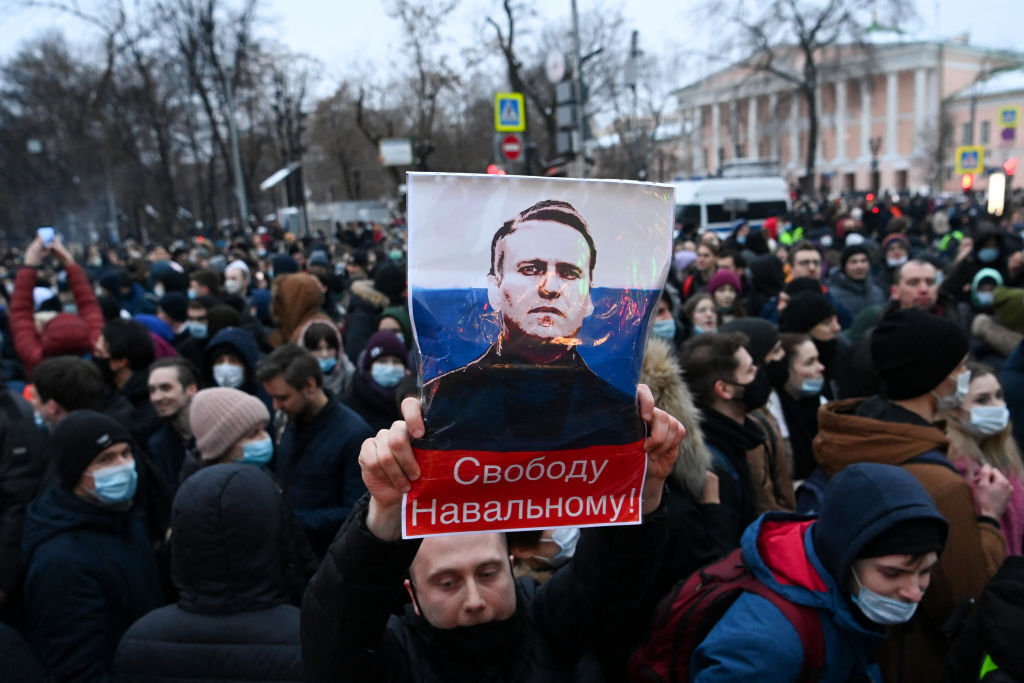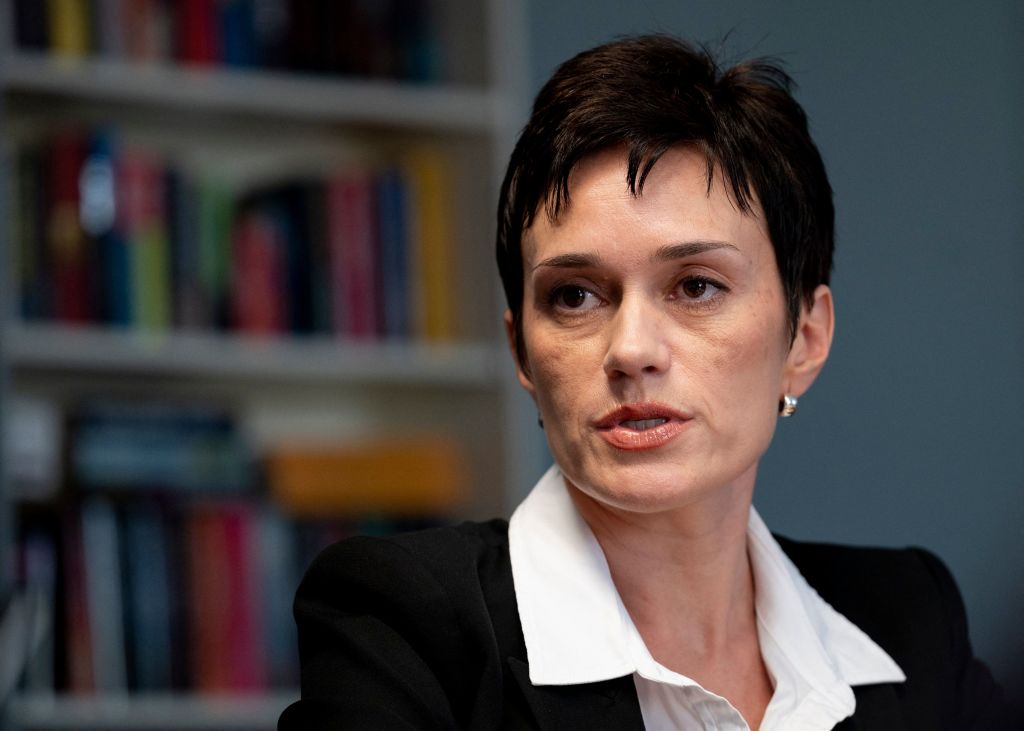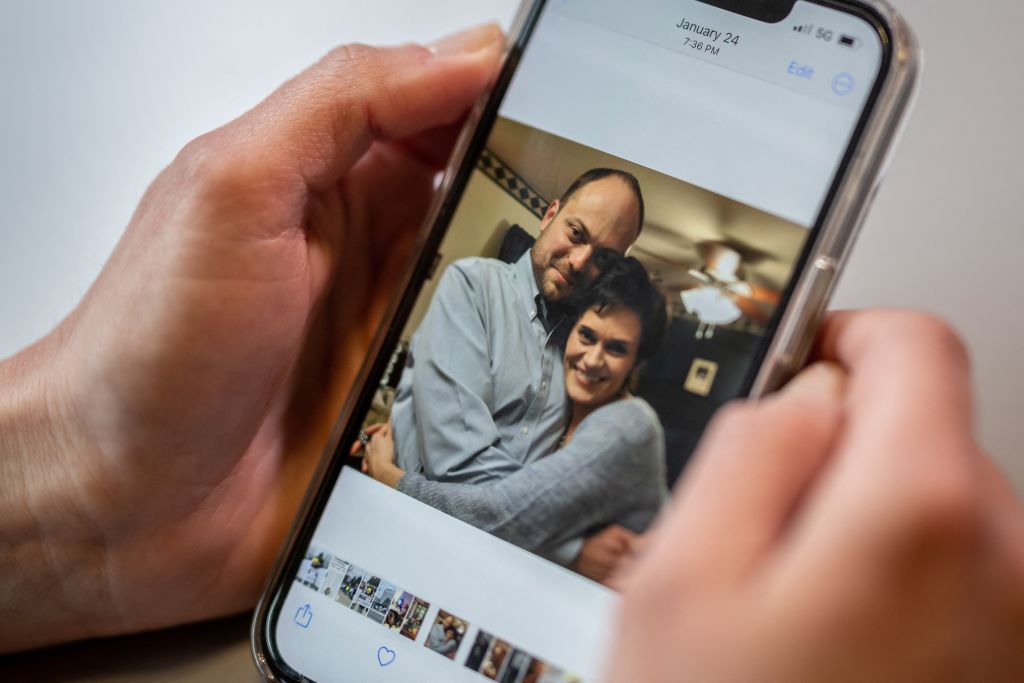
Few people understand what Yulia Navalnaya, the wife of the slain Russian dissident Alexei Navalny, is going through right now better than Evgenia Kara-Murza. Like Navalnaya, she has experienced what it’s like to have a spouse jailed for challenging Russian President Vladimir Putin. Her husband, the Kremlin critic Vladimir Kara-Murza, has been languishing behind bars since 2022 over his opposition to Russia’s invasion of Ukraine (although not a politician herself, she has taken up his activism in his stead). She too has experienced what it’s like to have her family targeted with assassination attempts—like Navalny, Vladimir Kara-Murza was poisoned by the Kremlin. Twice. And like Navalnaya, who on Monday vowed to continue her husband’s fight for a “free, peaceful, and happy Russia,” Kara-Murza understands what drives someone to pick up where their partner left off.
“I’m happy that she’s decided to continue Alexei’s work, to continue his legacy, because I think it will maybe help her cope with what she’s living through right now,” Kara-Murza tells TIME. “I know that work always helps me when I’m absolutely terrified for Vladimir’s life and I know that this will also give her this sense of purpose now that she lost the person she loved most in the whole world.”
Like Navalny’s family, many world leaders and Kremlin critics alike have laid the blame for Navalny’s death squarely on Putin, whose foes have often been met with violent deaths. But why the Kremlin would choose now to kill Navalny, who at the time of his death was facing decades in prison with little to no prospect of release, is unclear. The outcome of next month’s ritualistic election in Russia—in which all genuine challengers to Putin have been disqualified, jailed, or worse—was never in any doubt. If anything, things appear to be looking up for the Russian leader, particularly as U.S. aid to Ukraine stalls and as NATO braces for the possibility of a second Donald Trump presidency, which many observers predict would wreak irreparable damage on the militancy alliance.
In an eponymous documentary in 2022, Navalny predicted that an attempt on his life could only mean one thing: “That we are incredibly strong.” This was the message that Navalnaya has reinforced in the days since her husband’s death, which she says was orchestrated in order to “kill our hope, our freedom, our future.” It’s a belief that Kara-Murza shares—and one she says must drive their work now.
Speaking to TIME from Vienna, Kara-Murza discusses the timing of Navalny’s death, what it means for her own husband’s fate, and where the fight for a free and democratic Russia goes from here.
Read More: Alexei Navalny Is With Us Forever Now
TIME: How did you hear the news of Navalany’s death?
Evgenia Kara-Murza: I just woke up at home and that was the first thing I saw. I woke up to the calls of friends, colleagues and journalists.
I am absolutely certain that this was a political assassination because even if they did not use Novichok [nerve agent] or whatever else that they have in their toolbox, they tried to kill him once in the past and then they threw him in prison where he was tortured for three years in conditions in which his state of health was deteriorating. So far the Russian authorities offered two explanations of his death: the “sudden death syndrome,” so basically the authorities said that he dropped and died, or thrombosis, which according to his doctors was unlikely because he was not suffering from any condition that would make a blood clot likely. And the thing is, had it really been thrombosis, had it really been natural causes, why are the Russian authorities refusing to give Alexei’s body to his family? His mother is there, his lawyers are there. They are not even being allowed into the morgue.
Just like my husband, Alexei was a healthy man before they tried to kill him with Novichok and then held him for three years in a solitary, punishment cell. No causes can be seen as natural in these circumstances.

What do you make of the timing of Navalny’s death? Was he still perceived as a threat, even behind bars?
Every dissenter in Russia is a threat to the regime, judging by the harsh treatment they receive for their dissent. Alexei was definitely one of the biggest threats because he has always been incredibly effective in bringing people out in the streets. He has been incredibly effective in exposing the kleptocratic nature of this regime. He was, of course, seen as a personal enemy of the state.
I don’t know why he was killed specifically now. Vladimir Putin is a deeply disturbed person, so it would be a very dangerous feat to try and get into his head. But look at the short-lived campaign of [erstwhile presidential candidate] Boris Nadezhdin. He is not a prominent opposition political figure. But he was also the only candidate running on an anti-war platform. And in just two weeks—without access to state media, with all the restrictions and challenges that he faced during this short-lived campaign—he was able to collect over 200,000 signatures. And that in itself was an act of defiance and bravery on the part of those people who were leaving the signatures because when you leave a signature to support a candidate, you leave your full name, your address, all your personal information. But like my husband said during a recent court hearing, these people were there not to put signatures for Nadezhdin, but to put signatures against the war. And Vladimir Putin realized that; he realized that if Nadezhdin was able to collect over 200,000 signatures in just two weeks, without the ability of fully leading his campaign like a candidate should, he would actually be a threat to him. He wouldn't risk this. And so he decided it would be safer to not register him at all.
Vladimir Putin is not a confident leader who truly has the support of his population. A confident leader who believes that his population trusts him and has confidence in him would allow his opponents on the ballot. This leader would not use repression against his population. Vladimir Putin wants to create this warped image of reality in which there is this united support for him and the war. Meanwhile, arrests and detentions continue on a daily basis. Over 360 people were arrested just in the last three days for laying flowers for Navalny. I’m not saying that the regime will collapse tomorrow. But I’m saying that it is a regime that is not built on Vladimir Putin’s confidence of the support of the population. And the image that he wants to create for the world of the unity behind him has nothing to do with reality.
Threats to yours and your family's safety are unfortunately not new. Does Navalny’s death renew any of those fears?
I’ve lived with this since at least 2015, when first [Kremlin critic] Boris Nemtsov was assassinated and then, two months after that, when Vladimir was poisoned for the first time. And since that first poisoning, I’ve been sleeping with my phone, afraid to miss an important call and afraid to get that call. This is the reality of life in Russia today, of the life of someone who opposes the regime. You’re walking a very thin line and at every step you risk being killed, imprisoned, tortured, whatever. This is the life of anyone who stands up to the Putin regime.
Is your husband aware of Navalny's death?
Yes. His lawyer went to see him today. I was very, very worried because I cannot even imagine that you’re behind bars and you hear that your colleague had just been murdered. I asked his lawyer after the visit how Vladimir was and he said he was swearing—and then he added, “but he does not panic.” He’s very, very angry.
Was he close to Navalny?
They’ve known each other for many years. They always respected each other, as far as I know. Alexei was always impressed with Vladimir’s effectiveness on the international stage and Vladimir was duly impressed by Alexei’s effectiveness on bringing people out in the streets in Russia. So they were working in different areas, but striving for the same goal.

You are one of the few people who would have a proximate understanding of what Yulia Navalnaya has been through. Do you know her?
Surprisingly enough, we’ve never even met. Before Vladimir’s detention, I was never a public person and Yulia was never a public person. I know that Vladimir met Yulia, but I have never met either Yulia or Alexei in person.
Like you, Yulia has vowed to continue her husband’s work. Might you be able to work together?
I’m very open to dialogue and I am open to cooperation with anyone who is fighting for the same cause, so if such a possibility presented itself I’d be more than happy—why not? I believe that we need to bring our efforts together and fight the regime and we all have this duty to do everything we can to stop the war. As Russian citizens, we have this duty.
I was of course very much impressed by Yulia’s statement. I believe that the strength and resilience that was emanating from her are all the more impressive when you realize what exactly she’s living through right now.
I see that this fight is getting an increasingly pronounced feminine face. It’s those women who stand up because their loved ones were either killed or are in jail, both in Russia and in Belarus. And I believe this is actually a good thing because women can bring that long-forgotten understanding of values back to the world of politics; that understanding that you should act based on your values and not on your interests.
Indeed, neither you nor Yulia Navalnaya nor Sviatlana Tsikhanouskaya (who took up the mantle of her husband’s activism after he was jailed by Belarusian dictator Alexander Lukashenko) identify as politicians. You all seemingly took on this work out of loyalty to your partners, as well as to the values you share?
It’s both things. It’s not just out of love, which already is enough—people do amazing things out of love. But also, in my case, it’s the understanding that I also owe it to my kids. And I also owe it to my compatriots. I’m a Russian citizen too and the Russian state is currently leading a war of aggression in Ukraine and, as a Russian citizen, it is my duty to stand up and do something about it; to do my best to stop this aggression, to do my best to bring those responsible to accountability. So yes, in big part it is because I’ve always admired and admire and I believe I always will admire my husband and his dedication to his cause. And I understand that this kind of work cannot stop now. This work has to continue—the work on political prisoners, the work on Magnitsky sanctions, the work on making sure that the Russian state is held responsible under international law for the crimes that it is committing. That work that Vladimir has been doing for years cannot stop now when it is most needed.
So I have this motivation in continuing my husband’s work. I have the motivation of a Russian citizen who sees that the Russian state is killing civilians in Ukraine. And I also owe it to my kids because if I want to teach my kids about what true love and partnership is, I have to show it from my own example. If your loved one is in trouble, you fight for him or her. You do that. You stand up and fight for them. I owe it to my kids to fight for their father, to bring him back.
The last motivation, and not the least, is the fact that when 20 years ago I said that I would spend my life with this man, I meant it. I want to spend my life and grow old with this particular man and I need him alive and by my side. And I will fight for that right and for that dream that we share of spending our life together and growing old together.
This interview has been edited and condensed for clarity.
More Must-Reads From TIME
- The 100 Most Influential People of 2024
- Coco Gauff Is Playing for Herself Now
- Scenes From Pro-Palestinian Encampments Across U.S. Universities
- 6 Compliments That Land Every Time
- If You're Dating Right Now , You're Brave: Column
- The AI That Could Heal a Divided Internet
- Fallout Is a Brilliant Model for the Future of Video Game Adaptations
- Want Weekly Recs on What to Watch, Read, and More? Sign Up for Worth Your Time
Write to Yasmeen Serhan at yasmeen.serhan@time.com